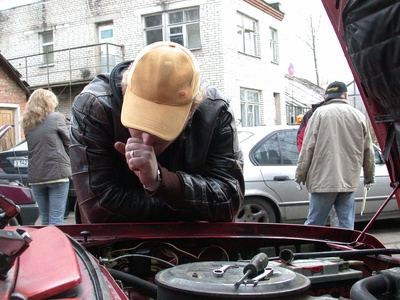
After miles of service, the valve seals in the cylinder head of your vehicle wear out and become brittle. The worn seals cause oil to leak between the valve stem and guide, causing blue-gray smoke to come out of the tail pipe every time you start the engine. On most vehicles, it's possible to replace these valve seals without removing the head. With the right tools, learn to perform this job in your garage and save a lot on repair costs.
Remove the air cleaner assembly from the top of the engine with a Phillips-head screwdriver to gain access to the valve cover on the cylinder head(s).
Disconnect the ground (black) battery cable with a wrench.
Detach and/or disconnect any components that might prevent you from removing the valve cover, if necessary. Use a ratchet, short ratchet extension and socket. Place small pieces of masking tape on electrical connectors, vacuum hoses and their corresponding fittings. Write matching numbers on the pieces of tape with a black marker so that you can easily identify and replace these components during reassembly.
Remove the valve cover with a ratchet, ratchet extension and socket.
Grab each spark plug wire around the boot, where they connect with the spark plugs, and pull the wires off with a twisting motion. Number these wires using masking tape as well to identify their position on each spark plug.
Clean the area around the spark plug of grime using a soft brush to keep dirt and grease from falling into the cylinder when removing the spark plugs. Remove each spark plug using a spark plug socket, long ratchet extension and ratchet.
Apply the parking brake, place the transmission in neutral and block the wheels with a wooden block to prevent your vehicle from rolling.
Check the pistons inside each cylinder through the spark plug hole with a flashlight, and start identify the piston, which is about an inch from the top of the cylinder. Fill that cylinder chamber completely with nylon rope. Use a small standard screwdriver to push the rope into the chamber. The rope should be long enough so that it hangs outside the spark plug hole for you to pull it out when done servicing that cylinder.
Cover the rest of the spark plug holes with clean shop rags to prevent screws, dirt or other objects from falling into the chambers.
Rotate slowly the crankshaft bolt clockwise with a large ratchet and socket just enough to put a little pressure on the rope inside the cylinder. This prevents the valves in this cylinder from falling into the chamber. The bolt is located at the center of the pulley on the bottom, front end of the engine. On some car models, you need to lift the front passenger's side wheel off the ground with a floor jack, support the vehicle with a jack stand and remove the wheel assembly with a lug wrench to gain access to this bolt.
Remove the rocker arm, which actuates the valve you are servicing, with a ratchet and socket. Use a valve spring compressor to depress the spring on the valve, and remove the valve keepers on each side of the top of the valve stem with a pair of needle-nose pliers.
Release the valve spring compressor slowly, and remove the valve spring, spring washer and valve seal. Apply a small amount of clean engine oil around the valve stem, install the new seal and replace valve spring washer, valve spring and valve keepers using the valve spring compressor.
Replace the rocker arm with the ratchet and socket and remove the nylon rope from the cylinder.
Service the rest of the valves following steps 8 through 13. Rotate the crankshaft bolt with the large ratchet and socket to position each piston at the correct height.
Replace the spark plugs, spark plug wires, valve cover and other components you had to remove or disconnect. Reconnect the ground (black) battery cable and replace the wheel assembly if you had to remove it. Remove the wooden blocks.